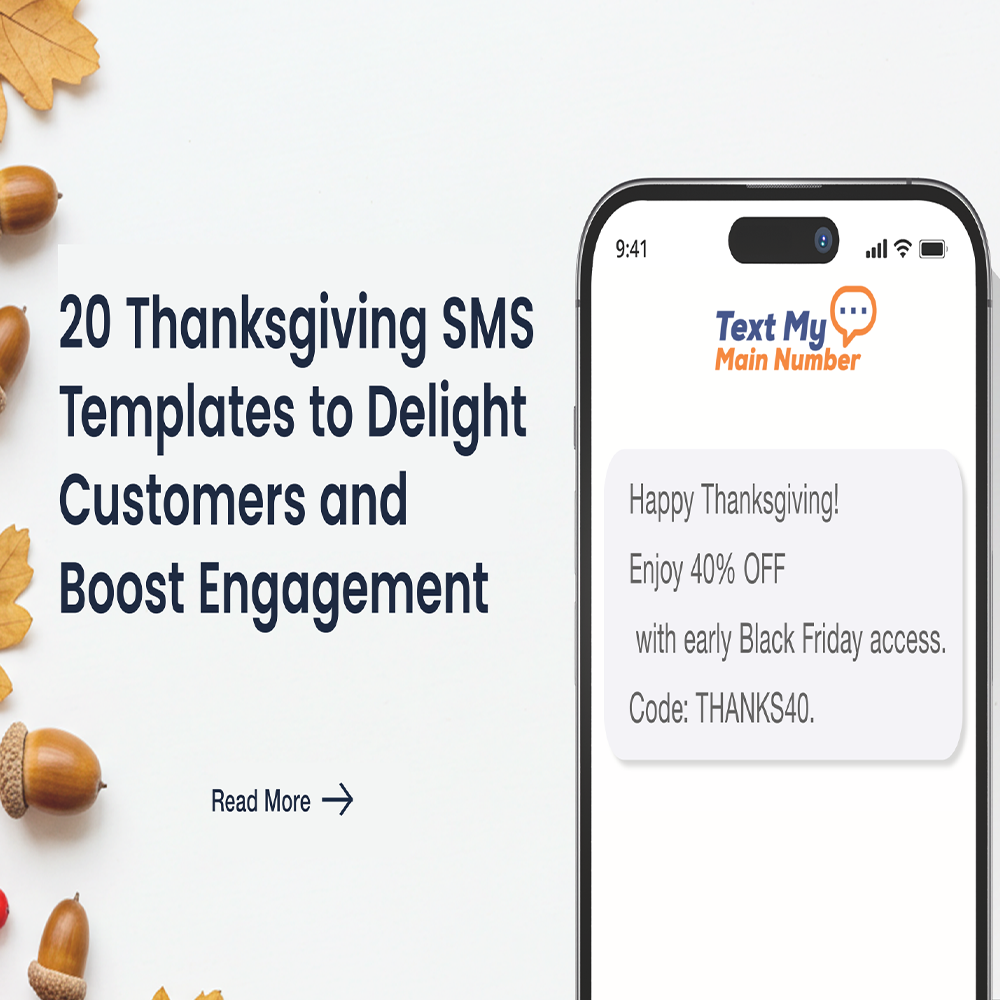Messaging vs. Texting: What’s the Real Difference?
SMS, MMS, iMessage, RCS—there’s no shortage of digital communicationchannels. But if you’ve ever wondered whether "messaging" and"texting" are the same, the answer is more complex than it seems.
Here’s the short version:
All texting is messaging, but not all messaging is texting.
“Messaging” is an umbrella term that includes SMS, chat apps (likeWhatsApp or Telegram), push notifications, and more. “Texting,” however,typically refers to SMS (Short Message Service), a specific mobiletechnology for sending brief, cellular-based messages without an internetconnection.
For businesses, this isn’t just semantics. Choosing between texting and messaging can impact compliance, deliverability, customer engagement, and ultimately—your bottom line.
A Brief History of Texting
Texting began as a bold idea in 1984, when engineers Friedhelm Hillebrandand Bernard Ghillebaert envisioned sending short bursts of text over GSM networks. That dream became reality in 1992 when Vodafone sent the first text:“Merry Christmas.”
From there, SMS exploded. By the 2010s, billions of texts were sent daily, cementing SMS as a communication cornerstone—even as messaging apps rose to popularity.
Want to see how texting fits into your moderncommunication stack?
8 Best Apps to Text from Your Computer
What Is Messaging?
Messaging includes any digital communication via internet-based platforms. These apps do more than just deliver words—they support:
- Real-time chat
- Emojis
- Voice/video
- File transfers
- Read receipts and statuses
Messaging relies on internet + same app platform.
Popular messaging platforms include:
- Facebook Messenger
- Telegram
- Snapchat
- Skype
- Slack
You’ve also likely encountered messaging as DMs (direct messages)on Instagram or LinkedIn. While the term varies, the principle is the same:both parties must be on the same app, connected via the internet.
What Is Texting?
Texting, or SMS, sends short messages over cellular networks. Unlike internet-based messaging, texting:
- Uses cellular network
- Requires no apps or internet
- Works on all phones
- Limited to 160 characters (or longer if broken into parts)
SMS vs. MMS
- SMS = Plain text, up to 160 characters
- MMS = Media (images, video, audio) with more data allowed
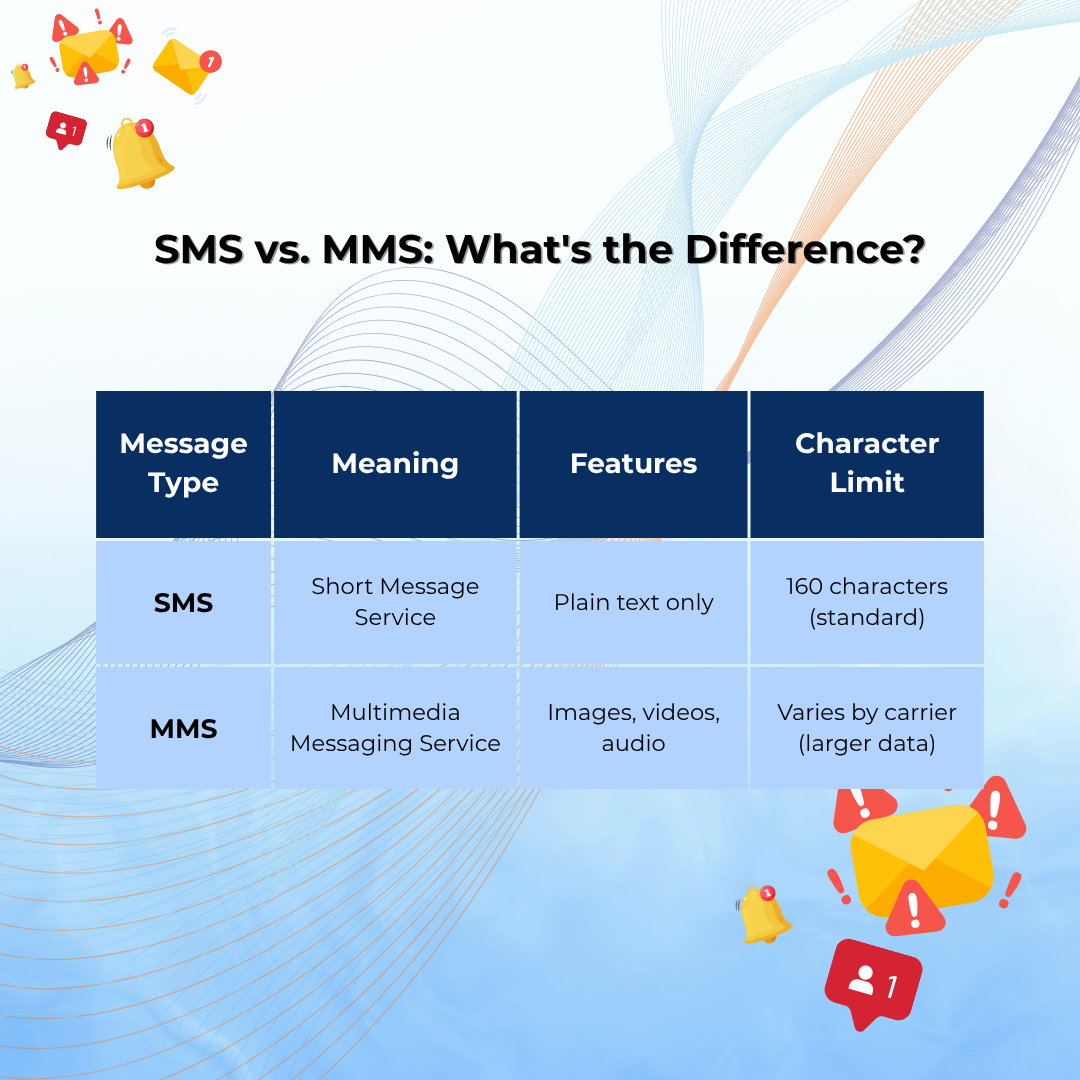
MMS became popular for sending “picture messages” before social apps took over. Today, MMS is still valuable for sending rich media content like promotional images or branded videos.
Why the Difference Matters for Businesses
Understanding these differences helps you:
- Choose the right tool for marketing, customer service, or appointment reminders
- Stay compliant with laws like the TCPA
- Maximize message deliverability
Messaging vs. Texting: Key Differences for Business Users
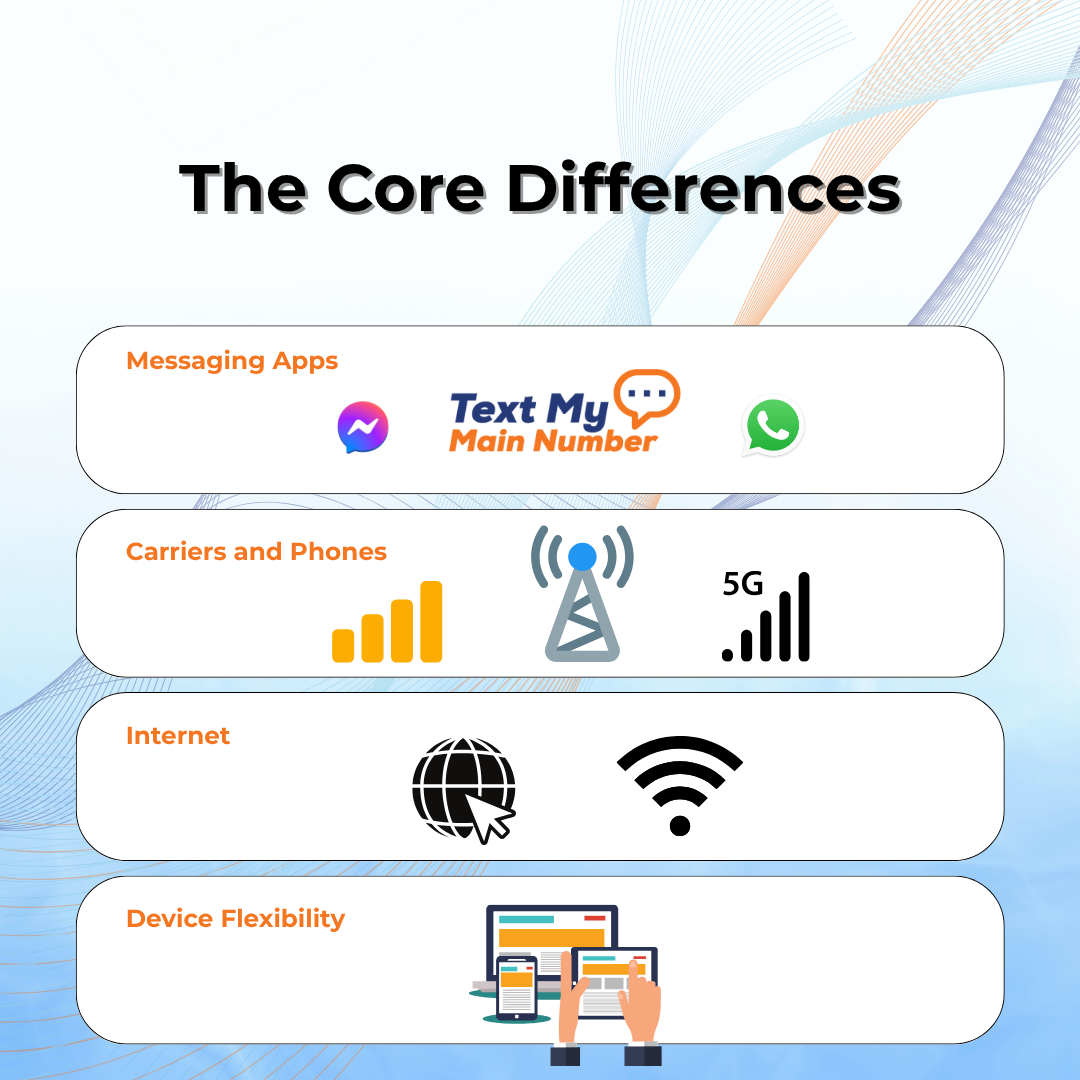
Messaging vs. Texting for Business
- Messaging apps require both users to have the same app. Texting doesn’t.
- Texting works without Wi-Fi. Messaging needs internet.
- SMS/MMS reaches any phone number. Messaging only reaches app users.
- Texting is governed by clear laws (e.g., TCPA). Messaging platforms vary.
In short: SMS wins for reliability, reach, and regulation.
Why Texting Still Dominates in the Messaging Era
Texting continues to outperform messaging apps when it comes to:
- Open rates
- Trust
- Compliance
- Simplicity
Quick stats:
- 93% of consumers say SMS feels more secure than email
- 54% prefer marketing offers via text, yet only 11% of businesses use it
- SMS spam rates are under 3%, while email spam exceeds 50%
TCPA Compliance Guide for Text Messaging
Real-World Business Use Cases for SMS
1. Service Providers:
Send appointment confirmations, follow-ups, and cancellations with guaranteed delivery.
2. E-commerce & Retail:
Use SMS for order updates, restock alerts, flash sales, and personalized coupons.
3. Healthcare & Clinics:
Text patients with reminders, secure links to portals, or quick feedback surveys.
4. Real Estate & Insurance:
Send time-sensitive property updates, paperwork reminders, or appointment links.
5. SaaS & B2B Platforms:
Trigger automated onboarding flows, renewal reminders, or account notices via SMS.
When Messaging Apps Work Better
Messaging apps are ideal for:
- Internal team communication (Slack, Teams)
- Peer-to-peer chat within social networks
- High-context conversations with rich media
However, they fall short for customer outreach due to app requirements, fragmented platforms, and inconsistent deliverability.
Mini Quiz: Should You Be Texting or Messaging?
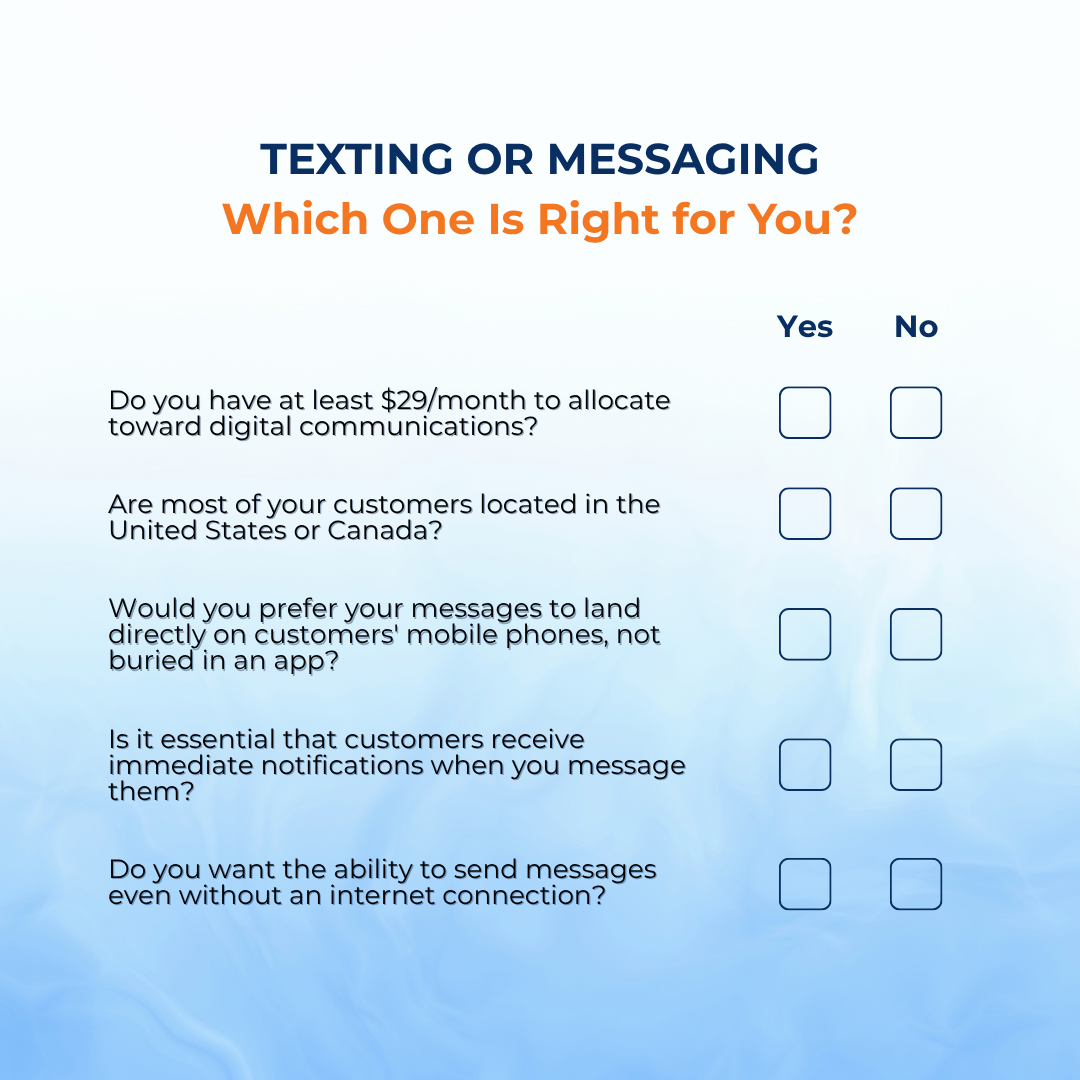
Answer YES or NO:
- Do you want your message to reach every phone, without app installs?
- Is instant visibility and delivery important for your business?
- Are your customers mostly in North America?
- Do you need compliance-friendly tools (e.g., opt-outs, consent)?
- Do you want messaging that doesn’t rely on Wi-Fi?
If you said “YES” to 3 or more, SMS is likely the better fit.
Final Thoughts: Messaging vs. Texting
Both texting and messaging have value—but they serve different purposes.
- Use messaging apps for chat-based interaction between users who share a platform.
- Use SMS for direct, high-priority, and compliance-ready communication.
With a platform like Text My Main Number (TMMN), you can scale texting for:
- Sales follow-ups
- Customer service
- Automated alerts
- Promotions that actually get seen
Ready to get started?
Start Your Free 14-Day Trial with Text My Main Number
✔ No credit card required
✔ Fully TCPA-compliant
✔ Desktop and mobile access
✔ Seamless SMS + call integration
Start your 14-Day Free Trial Now!
Still exploring?
Browse our Business Texting Blog, chat with our team, or reach out directly. We’re here to help you connect with customers—one message at a time.

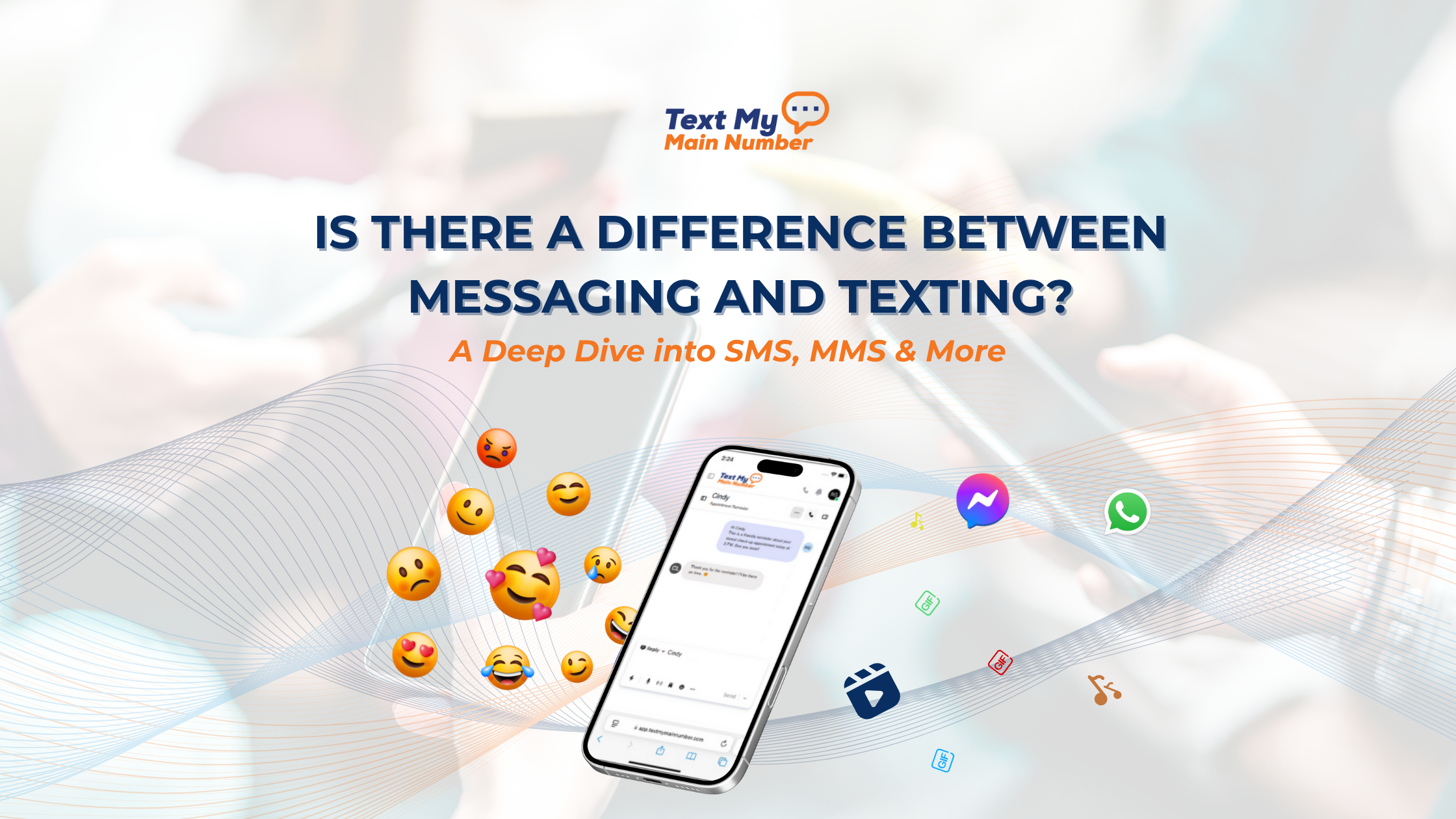


.svg)

